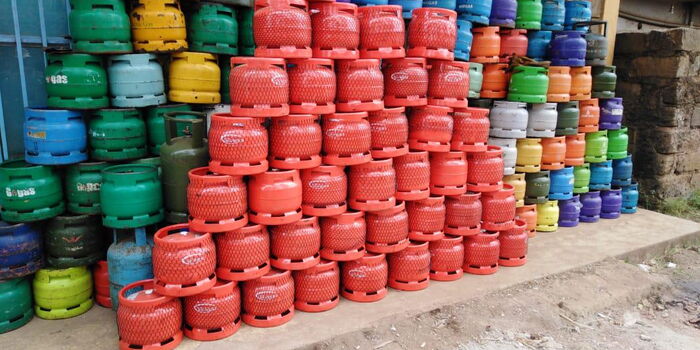Stakeholders within the Liquified Petroleum Products (LPG) sector have raised fears over the possibility of a hike in the prices of gas-related products should the government implement a set of new regulations in the sector.
The stakeholders maintained that the requirement for many licences in the LPG industry is set to have a ripple effect of a higher in the prices of by-products such as cooking gas for households.
This is despite the government’s promise to Kenyans to ensure that the prices of LPG products, especially for households, drop to encourage uptake. Currently the prices of refining gas cylinders retail at Ksh1000 and Ksh3500 for 6 and 13 kg cylinders.
Some of the stakeholders have termed the new regulations as punitive. The changes include the requirement to have specific and relevant different licences for exportation, importation, storage, refilling, distribution, and installation.
A photo collage of President William Ruto speaking on March 20, 2023 (left) and a collection of LPG gas on sale(right).
PCS
EPRA
Under the current regulations, most of the dealers assumed a single licence for the different services. The requirement to have relevant licences is what the stakeholders view that will have a ripple effect on the consumers.
Among them is a regulation that will see refilling LPG cylinders restricted between 6am and 6pm unless otherwise authorised by the Energy and Petroleum Regulatory Authority (EPRA).
At the same time, autogas stations will be mandated to operate in compliance with specified hours to reduce risks, with specifics varying based on local EPRA guidelines.
LPG business establishments will be mandated to install safety features, which include clear emergency response mechanisms and installations such as extinguishers.
Should the new regulations proposed by Energy Cabinet Secretary Opiyo Wandayi be passed, then failure to heed them by the LPG business enterprises would result in hefty penalties, which include licence revocation.
The new laws are part of the proposed Petroleum Regulations 2024.
The proposed regulations come nearly a year after the government faced pressure to act following a series of gas blasts, particularly in residential areas within Nairobi’s urban centres.
On February 2, 2024, a blaze broke out at a gas-filling company near Kabansora along Airport North Road in a gas blast incident that left more than 165 people with injuries and more than two people succumbed.
Energy Cabinet Secretary Opiyo Wandayi during a past media engagement at his office in Nairobi on November 25, 2024.


